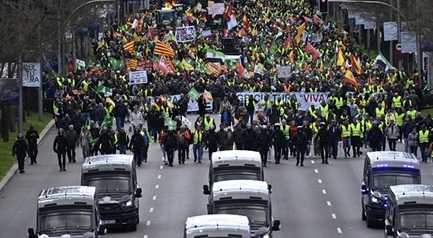
26 February 2024; AA: Thousands of Spanish farmers staged another massive protest in Madrid on Monday, this time coinciding with a key agriculture meeting in Brussels.
Government officials said at least 5,000 farmers and 100 tractors joined the march in the Spanish capital.
Unlike last week’s massive farmers’ protest in Madrid, this one was organized by the country's three main agricultural unions, which are in dialogue with the Spanish government.
On Monday, the protesters also targeted the European Commission office in Madrid.
The EU target comes as the bloc’s agricultural ministers meet in Brussels to examine ways to streamline the Common Agricultural Policy (CAP), which has been a major source of tension with protesting farmers across the continent.
“Who knows what’s better — someone sitting in an office in Brussels or a farmer anywhere around Spain?” Pedro Barato, president of the ASAJA farmers’ union, told journalists at the protest.
“The EU has to do a 180-degree turn on its agricultural policy. It has gone too far,” said Miguel Padilla, head of the COAG union.
Meanwhile, in Brussels, farmers were clashing with police during an intense protest that saw around 900 tractors in the city’s European quarter.
Ahead of the meeting, Spanish Agricultural Minister Luis Planas said politicians had an “opportunity” to reform the system and warned about “coming up short.”
“We are facing a European challenge so we need a European solution,” he told media on Monday. “We need a new European pact for our farmers and our rural communities.”
He said Spain would argue for the bloc to relax certain environmental regulations, crop rotation rules and eliminate or limit the need for farmers to upload “geo-located photos” of their activities.
He also said the EU should introduce so-called “mirror clauses” in trade agreements with non-EU countries to ensure that they do not use any chemical products banned in Europe.
Beyond EU regulation, the Spanish government also announced a slew of measures to appease farmers earlier this month.
However, farmers within and without the three main unions are continuing nationwide protests, which began in early February, though leaders have said that the future of the mobilizations will depend, in part, on the decisions made at Monday's EU agriculture meeting.




